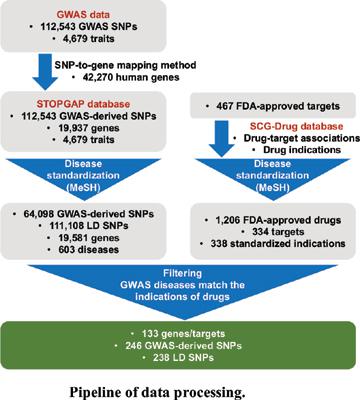Current Bioinformatics ( IF 4 ) Pub Date : 2021-06-30 , DOI: 10.2174/1574893616999210120182030 Yuan Quan 1 , Hong-Yu Zhang 1

|
Background: Genome-wide association studies (GWAS) have opened the door to unprecedented large-scale identification of susceptibility loci for human diseases and traits. However, it is still a great challenge to validate these loci and elucidate how these sequence variants give rise to the genetic and phenotypic changes. Because many drug targets are genetic disease genes and the general drug mode of action (MoA, agonist or antagonist) is in line with the consequence of target gene mutations (loss-of-function (LOF) or gain-of-function (GOF)), here we propose a chemical genetic method to address the above issues of GWAS.
Objective: This study intends to use chemical genetics information to validate GWAS-derived disease loci and interpret their underlying pathogenesis.
Methods: We conducted a comprehensive comparative analysis on GWAS data and drug/target information (chemical genetics information).
Results: We have identified hundreds of GWAS-derived disease loci which are linked to drug target genes and have matched disease traits and drug indications. It is interesting to note that more than 40% genes have been recognized as disorder factors, indicating the potential power of chemical genetic validation. The pathogenesis of these loci was inferred by the corresponding drug MoA. Some inferences were supported by prior experimental observations; some were interpreted in terms of microRNA regulation, codon usage bias, and transcriptional regulation, in particular the transcription factor-binding affinity variation induced by disease-causing mutations.
Conclusion: In summary, chemical genetics information is useful to validate GWAS-derived disease loci and to interpret their underlying pathogenesis as well, which has important implications not only in medical genetics but also in methodology evaluation of GWAS.
中文翻译:

GWAS 衍生疾病位点的化学遗传验证
背景:全基因组关联研究 (GWAS) 为前所未有的大规模人类疾病和性状易感位点鉴定打开了大门。然而,验证这些基因座并阐明这些序列变异如何引起遗传和表型变化仍然是一个巨大的挑战。因为许多药物靶点是遗传疾病基因,一般药物作用方式(MoA、激动剂或拮抗剂)与靶基因突变(功能丧失(LOF)或功能获得(GOF))的后果一致),在这里我们提出了一种化学遗传方法来解决 GWAS 的上述问题。
目的:本研究打算使用化学遗传学信息来验证 GWAS 衍生的疾病位点并解释其潜在的发病机制。
方法:我们对 GWAS 数据和药物/靶点信息(化学遗传学信息)进行了综合比较分析。
结果:我们已经鉴定了数百个 GWAS 衍生的疾病基因座,这些基因座与药物靶基因相关,并且具有匹配的疾病特征和药物适应症。有趣的是,超过 40% 的基因已被识别为紊乱因素,表明化学遗传验证的潜在力量。这些位点的发病机制由相应的药物 MoA 推断。一些推论得到了先前实验观察的支持;其中一些被解释为 microRNA 调控、密码子使用偏好和转录调控,特别是由致病突变诱导的转录因子结合亲和力变化。
结论:总而言之,化学遗传学信息可用于验证 GWAS 衍生的疾病位点并解释其潜在的发病机制,这不仅在医学遗传学中而且在 GWAS 的方法学评估中具有重要意义。



























 京公网安备 11010802027423号
京公网安备 11010802027423号